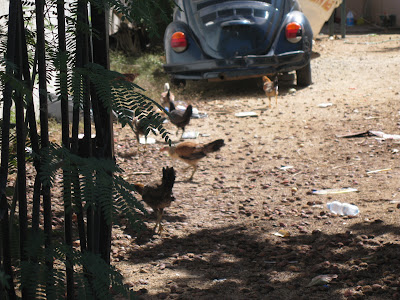Roosters crow in the morning and the little dogs bark. Across the street from the Mexican Inn the chickens peck in the vacant lot where the VW is parked, or maybe stranded. It's a good thing that I didn't write about the poverty I saw on the first day I walked through it, on the first day that I saw our little Inn situated right in the middle of it. I would have gotten it wrong. Probably I still won't get it right, but I might be closer.
Today when we walked past the dogs who have free rein of the streets, the graffiti on the walls, the broken windows, the piles of trash, the abandoned stores and cafes, and worse, I didn't see them quite the same way as I did that first evening when the bus let us off by the park and told us we'd find the Inn because it couldn't be far. Dragging our luggage we walked along the broken sidewalks along streets with no names. Finally a young man who was working on his pickup told us to turn left and then turn right and then turn left two more times. OK.
 |
| Poor man's patio |
Since that evening we have walked these streets scores of times, back and forth from the Marina, only about five or six blocks away. The area around the Marina is rich with luxury hotels and shops. "It is a different world from any other," explains a suave English speaking Mexican in a gallery. "It doesn't really belong to Cabo, and it doesn't belong to any other culture. It is simply a place to fish and play golf and buy beautiful things." But immediately on the edge of the marina are blocks of little store-fronts with people who swarm around the tourists with fake silver necklaces for sale -- "one dollar; almost nothing!" I've become careful not to stop to look at anything, because the moment I do: "what size you want? what color? come back here...I have size. Twenty-five dollar, but for you, twenty. You maybe take it at twelve. I give it to you for eight." Today I got caught buying a sixty-five dollar blanket/shawl/table cloth for forty dollars and I didn't even want it! I just wanted to get away.
Little children learn to be vendors: At dinner last night two beautiful children stopped at our table.
And I became owner of three hand painted whistles.
In the neighborhood, though, no one tries to sell us anything. They live here. This is the home world. It isn't the tourist world. Here the cafes are owned by the neighbors and serve the neighbors. Estella directed us to the cafe operated by her friend from church. The menu was expansive, but few offerings were actually on hand. After not very long at all, my focus turned to the people rather than the things around them. Slowly as the hours passed my notions of beautiful and desirable went through a transformation. Even my notions about danger changed. I started seeing that chair under the tree that we pass twice or more times a day as a place where someone actually sits to relax in the shade, rather than a misplaced piece of furniture. It's a little thing, to be sure, but a significant cultural shift.
 |
| You stop seeing the strangeness of clothes lines right downtown, and begin to be aware of the care with which the clothes are hung. |
Do you ever get the feeling that life is all topsy turvy? I see how difficult it can be to live down here. I see also how people help one another through their relationships. Estella is careful to take us where her friends work.It is an economy based on friendship. I suspect that few people in the neighborhood have missed out on the information that John and I are staying at the Mexican Inn--or that Estella and Miguel know who we are. And thus their home becomes our home. And you can feel it.






Comments